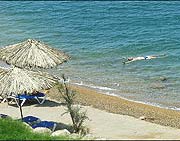
Jordan, Israel and the Palestinians are hoping that world leaders gathered on the shores of the Dead Sea this weekend will back their efforts to help save the lowest body of water on Earth.
Over the past three years the Dead Sea has decreased by three meters and the whole area is currently one third less than it used to be in the 1960s due to the diversion of the Jordan River water for irrigation, experts said.
A goldmine for potash extractors and a magnet for tourists who come to bathe in its salty waters, the Dead Sea could disappear in 50 years.
"The Dead Sea basin is facing an environmental decline and if it continues like this it will hit a catastrophe," Jordanian Water Minister Hazem Nasser cautioned.
To contain the damage, Jordanian, Israeli and Palestinian officials will submit a project to channel water through a canal from the Red Sea to the Dead Sea, at the weekend meeting here of the World Economic Forum1 (WEF).
Nasser warned saving the mineral-rich Dead Sea was a large-scale project that would not just happen overnight.
"It needs a lot of studies and preparation and huge financial resources," he said.
"We have to do a series of studies first: environmental, social, technical. We did a pre-feasibility study and we are now shooting for a full feasibility study."
The project, which the sides hope to fund through the World Bank and the private sector2, is estimated to cost 1.5 billion dollars.
 收听单词发音
收听单词发音 
